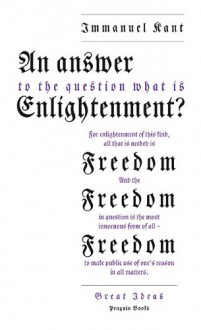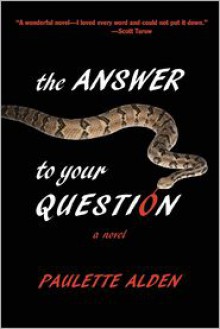
17 January 2013
Okay, this pamphlet (it is way too short to be called a book, but still there is an entry on Goodreads, so while I will not count it as a part of the 2013 reading challenge, I will still write a commentary on it) is probably where the term 'Freethinker' came from. My first encounter with a so called 'freethinker' was in the Adelaide Railway Station when I was handing out invitations to the church carol service and I ended up speaking to a man who termed himself a freethinker. Personally, I liked the term, but had really encountered it before. A quick look on Wikipedia suggests that a freethinker was an atheist, but I suspect that the definition may go deeper than that (positions regarding truth should be based on logic, reason, and empiricism rather than tradition, authority or other dogmas, which does not necessarily mean that the philosophy is atheist).
This pamphlet is about being imprisoned in one's mode of thinking, and while Kant opens with how the modern individual (if one can consider 1784 modern, but then what he wrote back then is still true today) goes to a professional when he wants certain things done so that the individual does not need to be able to know how to do it himself. For instance, if he wants legal advice, he goes to a lawyer, if he wants medical advice, he goes to a doctor, and if he wants spiritual advice, he goes to a priest.
However, this is where the crux of Kant's argument comes down, not so much regarding the lawyer or the doctor (for individuals are not expected to be able to have such knowledge) but rather with regards to visiting the priest, or to be more precise, the pastor. Kant's argument is that the pastor is enslaved to his mode of thinking by the doctrine of the church and is unable to speak outside of that rigid doctrine when addressing his congregation. In a way the congregation expects him to remain true to that doctrine, but the pastor in the end enslaves himself to that doctrine because he is unable to speak, or even think, outside of that rigid circle.
So, then, what is enlightenment? Well, from what I gather from this pamphlet it is being able to have an open mind, and being able to think outside of the rigid doctrine of society, This can be dangerous, not only to society, but also to one self. The problem is that people do not want to think outside of the box, and in particular people do not want you thinking outside of the box because by doing that you may uncover a truth that they do not want you to know. In fact, it may simply turn out that you have exposed them as crooks, but they do not want you to do that, and in fact they do not want you freed from their rigid dogma, or from under their control, so they will accuse you of being paranoid, or even insane.
So, I guess enlightenment is being able to free your mind and your thoughts from the rigid dogma of society (and notice how I am not focusing on the church here, unlike Kant, who we must remember was writing in the 18th century, so the church still had quite a lot of influence in society and impacted on the way society thought), to be able to ask questions, and not just any old questions (why is the sky blue?) but difficult and challenging questions (you ask us to tithe, but does not the Bible suggest that the idea of the tithe went out with Christ's death and resurrection, and also are we not meant to support those who are poorer than us than to give some guy the opportunity not to be a productive member of society?). I do not think that Kant is writing some anti-Christian doctrine here, but is rather challenging a rigid dogmatic view to life and getting people to think rather than to simply act without thinking.
20 January 2013
After listening to a lecture based on this tract I felt that I should write down a few more thoughts regarding it. Basically, during the period Kant was writing there were two different philosophical thoughts: the Descartes' school of thought which said 'I think, therefore I am', which in a way led to the concept of Existentialism, the concept that the only reality that is true is the reality that you perceive for yourself; and the Lockian point of view, in which the only reality that exists is the reality that can be determined by the scientific method - if you could not prove it by experimentation then it pretty much did not exist.
Kant apparently took a middle road saying that both feeling and experimentation has a role to play, and that in taking this road he set the course of the Enlightenment. However I find that difficult to accept because the world in which we live today, or at least the Western world, tends to fall into two camps, and that is the camp of the so called educated, and the camp of those who are not educated in the same way. Personally I don't want to call them uneducated, because I generally fall into that category.
With the educated category (and once again that is a bad description of them because they are not really educated in a way because they do not look at both sides of an argument but rather that they push their own viewpoint without considering any other view that may be different from their viewpoint) we have what is called the New Athiests, who believe that religion cannot be proved scientifically and therefore the spiritual realm does not exist. As such they denigrate anybody who believes in a spiritual reality as being backward and trapped in the past. However, on the opposite side of the fence, you have the fundamentalists who believe that anything that comes from humanity is ultimately flawed and not to be trusted, and as such reject science and anything that is not supported by their religious teachings (and you will note that I don't focus on Christianity here, though here in the West they tend to be the dominant ones in this camp).
I guess Kant's ideas generally apply to those of us who take the middle road, namely the road that says that both sides have equal value. It applies to those of us who accept evolution (even to the limited extent that I do) and consider that the universe was created. It applies to those of us who recognise that God has gifted us with intelligence to be able to explore and try to understand this world, and to also understand that the Bible, while it may be a cosmological text, is not necessarily a scientific text. In the end, it applies to the bulk of us who believe in the existence of God, but also understand that salvation is not determined by whether we believe in a literal interpretation of Genesis or Revelation.
21 February 2013
Now I have read this pamphlet again after having listened to a lecture on Kant and I feel that I need to slightly alter what I have said above, and while I do not consider what I have written above to be wrong in a sense, I feel that I have not necessarily got out of the pamphlet what Kant was trying to outline. It is true that he is calling for us to think for ourselves, but the whole question of 'what is enlightenment' comes down to the opening few paragraphs: Enlightenment is man's emergence from his self-incurred immaturity. Immaturity is the inability to use one's own understanding without the guidance of another. This immaturity is self-incurred if its cause is not lack of understanding, but lack of resolution and courage to use it without the guidance of another.
The idea that Kant is trying to raise here is not so much being a freethinker, but learning to think for ourselves. The key point that he is bringing out is to be able to make a decision without constantly going to others for guidance. That is what Kant describes as being mature. For instance, instead of going around to all of your friends and asking them if you should ask a girl out on a date, make the decision yourself (and live with the consequences of that decision, whatever the consequences are).
Now, Kant is not being anti-authoritarian here (particularly since he is writing in 18th Century Prussia, which was far from being a Liberal Democracy). In fact he writes to those in power and tells them that he is not telling people to be anti-authoritarian. The whole question of being able to think for one self does not mean that you reject all guidance, or even live a life of rebellion, but rather to be able to decide and choose, and then be able to live with the consequences of the choice that you make. It is the freedom to choose whether you wish to rebel or to obey, but in making that choice, to be able to raise the pro's and the cons of that choice before making it.
It is not the question of obedience that Kant is talking about but rather enslaving yourself to other people by giving the power of choice over to them. However it is not always that easy because there are always people out there that want to enslave you by making the choices for you, and even twisting reality so that you are unable to make that choice. We may live in a liberal democracy, but even in this liberal democracy, choices are made for us. In fact these people (whom we will refer to as 'insecure Betas') actually believe that they only know the right way to do things, and try to interpose themselves into your life so that you will seek guidance from them, and always turn a conversation around to giving advice to you (you can never have a discussion with them because it is always what they think and why your thoughts are wrong).

 Arrived today, out of the blue, from Greenville, where this author grew up.
Arrived today, out of the blue, from Greenville, where this author grew up.
 Log in with Facebook
Log in with Facebook 







